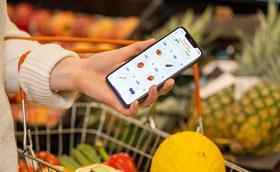
The latest figures from Kantar show take-home grocery sales fell by 5.1 per cent and digital baskets shrank during the 12 weeks to 11 July 2021.
Despite this year-on-year decline, sales are still strong compared with pre-pandemic times and shoppers spent £3 billion more on groceries than they did during the same period in 2019.
Commenting on the latest retail data, Fraser McKevitt, head of retail and consumer insight at Kantar, said: “The number of people choosing to buy groceries online fell by 81,000 in July compared with the same four weeks last year.
'As the nation returned to shops, workplaces and restaurants over the past month, digital baskets shrunk by 8 per cent to an average of £80 per shop, the lowest since February 2020. As a result, year-on-year sales growth for online groceries has dropped for the first time ever – falling by 2.6 per cent. The channel currently accounts for 13.3 per cent of the total market.”
With online’s rapid rise starting to taper, Ocado’s growth has also slowed over the past 12 weeks to 3 per cent, though it remained the fastest growing retailer and increased its market share by 0.1 percentage points to 1.8 per cent.
McKevitt added: “A number of the grocers saw sales fall this month but there were notable gains for some. Waitrose, with sales up by 0.1 per cent over the 12 weeks to 11 July, was the only retailer with a bricks and mortar estate to achieve year-on-year sales growth.
'Waitrose lost shoppers last year when people focused more on picking up essentials and limiting trips outside the home. But as the nation becomes more confident and starts to buy groceries from multiple places again, it has outpaced its peers with increasing footfall and as a result its market share rose by 0.3 percentage points to 5 per cent.
“Aldi and Lidl both won market share this period. Aldi gained 0.4 percentage points to hold 8.2 per cent. while Lidl’s share of the market increased by 0.2 percentage points to 6.1 per cent. Tesco won its biggest year-on-year share increase since December 2016 this period, growing from 26.7 per cent last year up to 27.1 per cent in the latest 12 weeks.”
Sainsbury’s, where online sales continue to perform strongly, moved its share up to 15.2 per cent from 14.9 per cent last year. Asda’s share slipped by 0.1 percentage points to 14.0 per cent and Morrisons fell from 10.3 per cent last year to 10.1 per cent this period.
McKevitt continued: “Morrisons has made plenty of headlines this month following private equity interest in the business; a change of ownership in the near future looks to be highly likely.
'Following a year of solid sales performance, shoppers are clearly pleased with what the Bradford-based grocer has offered. It sets itself apart from the competition through its distinctive fresh counters and a continued use of multibuy promotions. While other retailers have cut back on counters, 14 per cent of Morrison’s shopping trips include loose meat, fish, dairy, or delicatessen items from its Market Street sections, more than double the market average. Over 30 per cent of promotional sales in Morrisons are multibuy offers, requiring the customer to buy two or more items. This is in contrast to its big four rivals which have largely focused efforts on price cuts.”
Iceland, Co-op and independent stores all received a boost in the early days of the pandemic as people shopped closer to home. In comparison with the highs of 2020, these grocers’ market share has inevitably fallen this year but all three experienced double digit sales growth compared with 2019.






No comments yet